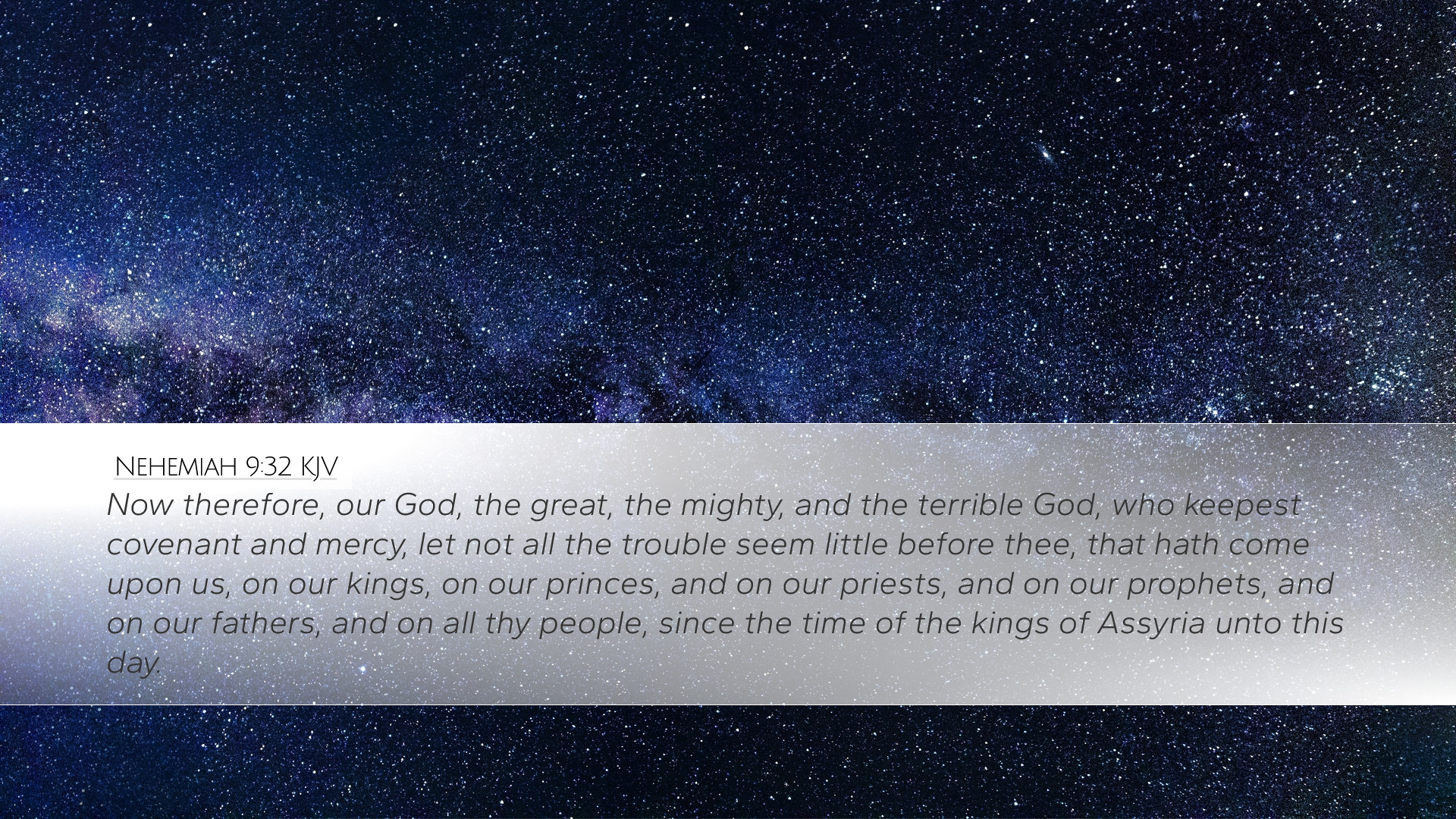Commentary on Nehemiah 9:32
Bible Verse: Nehemiah 9:32 - "Now therefore, our God, the great, the mighty, and the terrible God, who keepest covenant and mercy, let not all the trouble seem little before thee, that hath come upon us, on our kings, on our princes, and on our priests, and on our prophets, and on our fathers, and on all thy people, since the time of the kings of Assyria unto this day."
Introduction
This verse is a part of a prayer by the Israelites during the restoration period post-exile, where they are confessing their sins and recalling God's faithfulness in spite of their unfaithfulness. The verse highlights God's greatness, power, and the significance of His covenant, while also acknowledging the hardships endured by the people.
Theological Significance
The verse encapsulates profound theological themes such as:
- The Nature of God: The descriptors "great," "mighty," and "terrible" reflect God's sovereignty and majesty. This reinforces the need for reverence and humility before Him.
- Covenant: The reference to God keeping “covenant and mercy” emphasizes His faithfulness. God’s commitment to His people is unconditional, and He is ever ready to receive them back when they repent.
- Human Suffering: The plea for God to take notice of their troubles indicates an understanding of their collective suffering and the need for divine intervention. It underscores the reality of suffering in the life of God’s people.
Commentary Insights
1. Matthew Henry's Commentary
Matthew Henry emphasizes the deep reverence that the people express in acknowledging God’s greatness. He points out their awareness of their circumstances, recognizing the lengthy history of troubles that have marked their experience since the Assyrian captivity. Henry observes that remembering God's past mercies invites renewed hope and encourages the people to cry out to God for relief from their present troubles.
2. Albert Barnes' Notes on the Bible
Barnes focuses on the aspects of God’s attributes, noting how the term "terrible" reflects God's holiness and the awe it inspires among the people. He suggests that this acknowledgment serves as both a reminder of their covenantal relationship and a foundation for their appeal. Barnes stresses the importance of humility in their confession, recognizing their need for God’s mercy and intervention.
3. Adam Clarke's Commentary
Clarke analyzes the context of the prayer, highlighting that it is an appeal to God's character and faithfulness. He interprets "let not all the trouble seem little before thee" as an earnest request for God to be mindful of their plight, suggesting that even the intensity of their suffering is worthy of God’s attention. Clarke also notes the collective nature of their appeal, reflecting a community acknowledging their shared history and seeking restoration.
Practical Applications
- Recognizing God's Sovereignty: The depiction of God’s might in this verse serves as a reminder for believers to trust in His omnipotence, especially during times of distress.
- Covenant Relationship: Understanding the covenant aspect encourages faithful living and obedience, assuring believers that God remains committed to them.
- Confession and Repentance: The acknowledgment of sins opens a door for personal and communal repentance, vital for restoration in the life of the church and individual believers.
- Endurance in Suffering: The collective cry for help illustrates the importance of community in bearing one another's burdens, paralleling the need for solidarity within the church today.
Conclusion
Nehemiah 9:32 masterfully encapsulates the character of God and the reality of human suffering. As pastors, students, theologians, and Bible scholars reflect on this verse, it beckons an understanding that God's greatness is a source of comfort and hope amid adversity. It calls for a response of humility and a commitment to recognize the covenant relationship believers share with God, beckoning them to live out their faith authentically.


